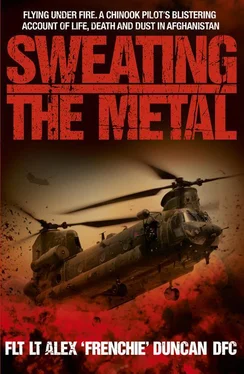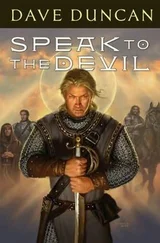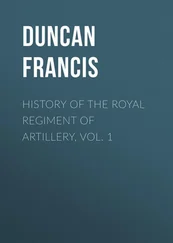There was a party after our sorties. It was Taranto night, the celebration of a famous WWII raid at Taranto where Royal Navy aircraft sank most of the Italian Fleet. When I walked up to the bar I saw Alison in the corner talking to some friends. She looked absolutely magnificent. I’d never believed in love at first sight before, but I was absolutely, hopelessly smitten now. I knew immediately that she was the girl I was going to marry. We’ve been together ever since.
There was just one thing I needed to resolve before I graduated from the OCF and it concerned my nickname. When I first arrived I was astonished to meet another ‘Frenchie’. I thought it was a wind-up at first, until we got chatting and I discovered that, like me, he had a French mother and a Scottish father. His real name was Neil McMillan but we muddled along on the course both being known by the same moniker until the instructors decided enough was enough. They said only one of us could graduate with the right to be known as Frenchie, so a French-off was organised with the instructors as umpires.
On the night concerned, we met in the Mess and undertook a number of events designed to test our ‘Frenchness’. These events involved a duel with baguettes instead of swords and eating cloves of raw garlic and live snails (dug up by other members of the Flight from the garden half an hour before). The night culminated in a quiz where the invigilators went to extreme lengths to ensure our questions were equally difficult. I was asked really ‘tough’ ones like, ‘What is the name of the monument at the Place Charles de Gaulle end of the Avenue des Champs-Élysées?’ while Neil got piss-easy ones such as: ‘Who won the French Open in 1972?’
There could only be one Frenchie, so given that Neil refused to eat the snails and I answered all of my (ahem) incredibly difficult questions correctly, I was declared the winner. The only thing Neil won was the right to call himself ‘Frock’!
Apparently, Alison arrived quite late in the evening only to find a very drunk boyfriend wearing some dodgy silk pants (where they came from, I’ve no idea) and a beret.
I was so delighted to have earned my name back that I ordered a badge with ‘Frenchie L’Original’ over a Tricolour which, for some reason, really wound Neil up! To this day, I’ve no idea why…
After that, I sailed through my final handling check and passed my night-flying qualification. That marked the end of the OCF for me. There was the obligatory giant piss-up and that was it. Actually, no it wasn’t; not quite! I still wasn’t combat ready – and my wings? Let’s just say they were now half sewn on!
I was posted to ‘A’ Flight, 18 Squadron on graduating the OCF, and although I wasn’t yet combat ready, my status felt permanent at last. I’d been at RAF Odiham long enough that I was pretty much in step with its daily rhythm. I knew my way around, knew most of the key personnel in the Squadron – and also at 27 Squadron, which was located just across the base. Hannah had gone to 27 Sqn, so although we were no longer part of the same unit, our paths crossed pretty regularly.
My first sortie as an 18 Sqn pilot was on February 4th 2004, with Paul ‘Windy’ Millar, a Qualified Helicopter Instructor (QHI) on the squadron. It was pretty much a belt-and-braces assessment to ensure that the OCF had done what it was supposed to and dropped me off the conveyor belt a fully-fledged, limited combat ready Chinook pilot. Also, Windy wanted to get an idea of my ability. Even with the OCF firmly behind me, there were still checks to pass – that’s one aspect of flying that never stops. The day you think you can stop learning is the day you have to stop flying.
In May, the Squadron deployed aboard HMS Ocean , the Royal Navy’s sole helicopter carrier. We were sailing across the Atlantic to support the Royal Marines on Exercise Aurora in the US. It was my first experience of an operational exercise and where I got my Aircraft Carrier tick. That was, to date, some of the most difficult flying I’ve done. There’s a saying among pilots that the three best things in life are a good landing, a good orgasm and a good bowel movement, and a night-time carrier landing is one of the few opportunities in life to experience all three at the same time.
You’re in the middle of the Atlantic, you’re not using NVGs, and you take off from this absolutely enormous aircraft carrier which, when you’re on it, feels like a city at sea. It’s got light everywhere; you feel like it’s visible for miles. Taking off is easy. You simply come into the hover, slide the aircraft off to the side until you’re above the water, turn the tail and disappear into the night; although even that was, er… interesting. There was no ambient light other than what was on the ship; there was no moon – just the inky blackness of the Atlantic Ocean forty foot below me, promising almost certain death. It’s a disconcerting experience for a pilot.
The circuit is 400ft and it’s not like I had to fly a long way out. So I climbed up, levelled off, turned left. You think you’ve got the correct wind; the ship is going in one direction so in theory it’s easy. I looked down and across to get a visual on the massive ship and… What the fuck? From one mile out, and at just 400ft, it’s like someone has turned all the lights off and left a single 40 watt bulb burning in the middle of the ocean. That’s what I had to aim for.
The hardest thing by far is when you make your final turn – you have to turn, descend and, at the same time, reduce your forward speed. But at 400ft, descending at 1,000ft per minute, you’re going to hit the water in twenty-five seconds if you misjudge it. Initially, you probably wouldn’t even notice because there’s no demarcation between the sky and the water because it’s so dark – until you felt the impact, that is, and sank to the deep. You can’t see the water; everything’s black apart from this single 40 watt bulb in the middle of the ocean.
To make life a little more interesting, you approach the ship on a bearing of Red 165, the way they do it in the Royal Navy. Red 165? What the fuck’s that? You won’t get the Navy using a compass for navigation to the ship; that’d be far too easy. No, they have this fucked-up system where Red represents left, 0–180 and Green represents right, also 0–180. So Red 165 should give you the angle to the ship. The idea is to come alongside it, hover next to it until you match your speed. Get the rearmost line on the deck under your arse, and move across. Look for the forward line in front of the cab, and… down! It sounds easy when you say it. It wasn’t.
The Squadron’s part in the exercise lasted over a month, so it was about six weeks since Alison and I had last seen one another. That was hard; we spoke every day but I must have spent a month’s salary on phone cards. HMS Ocean docked in Jacksonville, Florida and we got a week’s leave, so I’d arranged for her to fly out and join me. That’s when I asked her to marry me. She said yes. She’s the most military-focused civilian I’ve ever met. Personally, she’s all the woman I’ve ever wanted, and professionally, I’ve never known anyone like her. She’s got real leadership skills, having worked her way up to a senior role in the Cabinet Office briefing Tony Blair and other ministers. She’d clearly impressed a few people because while I was struggling to fly on instruments and worrying about my fledgling career as a pilot, she received an MBE for her work on the Afghanistan Campaign in the wake of 9/11.

Things ramped up pretty quickly after our return from HMS Ocean . I did some taskings in Northern Ireland and not long after Christmas 2004, the Squadron went to Iraq, which was my first operational deployment. It was a two-month Det and, to be honest, not a great deal happened. It was like flying a big green taxi; I spent most of my time just ferrying men and equipment around. Aside from a single mission where there was a very remote chance of coming under contact, it was all pretty low-key. The accommodation was first class, nothing like the basic facilities in Afghanistan. We had a bar and a swimming pool and we got to fly. It was Iraq, so in theory it was dangerous, but the flying was good. We’d come back in the evening, go for a swim, have one or two beers in the bar… how bad could it be? I thought that was what all operational deployments would be like, but how wrong I was…
Читать дальше













